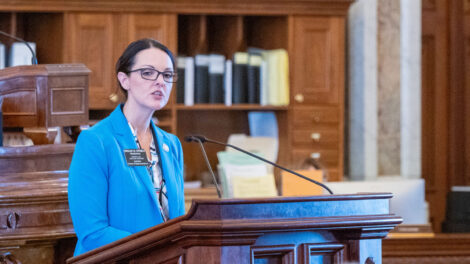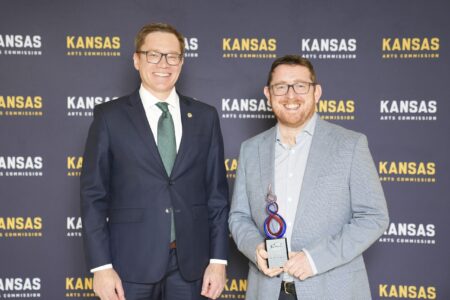Gov. Kelly takes another swing at joining 41 states that have expanded Medicaid

photo by: Sherman Smith/Kansas Reflector
Gov. Laura Kelly enters the House chamber to deliver her State of the State address on Jan. 15, 2025.
TOPEKA — Kansas Gov. Laura Kelly announced Thursday her seventh attempt to expand Medicaid, which has continuously faced staunch opposition from Republican leadership.
The Healthcare Access for Working Kansans, or HAWK, Act, would expand the option of Medicaid coverage to roughly 150,000 Kansans. Kelly has proposed expansion every year she has been in office, touting its benefits for rural hospitals, health care workers and the state economy.
“In fact, by waiting to expand Medicaid, we have wasted over $280 million and left $7.6 billion on the table in Washington, D.C.,” Kelly said. “I encourage the Legislature to advance Medicaid expansion this session so we can bring Kansas taxpayer dollars back home to support our health care system.”
During the 2024 legislative session, Republican leadership allowed hearings on a Medicaid expansion bill for the first time in four years after pressure from Kelly and advocates. In October, an annual statewide survey from Fort Hays State University found that more than 70% of respondents support expansion.
Rep. Barbara Ballard, D-Lawrence, and Sen. Pat Pettey, D-Kansas City, Kansas, introduced the bills in the House Appropriations Committee and the Senate Ways and Means Committee.
The governor claims Medicaid expansion would create 23,000 new jobs and add $1.2 billion in funding to the Kansas economy while reducing health care costs and safeguarding struggling rural hospitals. About 62 rural hospitals in Kansas are at risk of closing.
Kansas is one of nine states in the U.S. that have declined to expand Medicaid after the option to do so became available in 2010 under the Affordable Care Act. Expansion extends eligibility to people who earn up to 138% of the federal poverty level. Without expansion, an estimated 39,000 adults in Kansas are caught in a coverage gap, making too much to be eligible for Medicaid but too little to enroll in private health insurance.
“Studies show 63% of our state’s rural hospitals are at risk of closing,” said David Jordan, president and CEO of the United Methodist Health Ministry Fund, a Hutchinson-based nonprofit focused on rural health care.
“A sustainable health system is crucial to the future of rural Kansas communities, who rely on their local hospitals to receive timely and necessary care,” Jordan said.
Medicaid, in covering those who wouldn’t otherwise have health insurance, is the backbone of that system, Jordan said.
“Our hospitals already face high levels of uncompensated care, and they rely on Medicaid reimbursements to help keep their doors open — especially in our rural communities,” he said.
— Anna Kaminski reports for Kansas Reflector.





